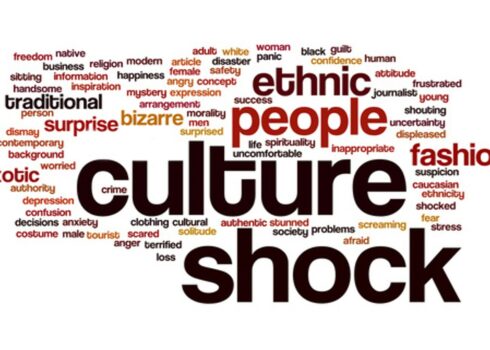Unit C.1.4 Knowing culture shock and its effects
UKnowing culture shock and its effects
Knowing culture shock and its effects
Knowing culture shock and its effects
Another important aspect we should be aware of is culture shock. Culture shock is a term used to describe what happens to people when they encounter unfamiliar surroundings and conditions. Thus, culture shock is related with cultural encounters, i.e. we experience culture shock only when we encounter other cultures. Culture shock is related with cultural encounters, i.e. we experience shock when we encounter something that is unknown and unexpected.
What would be the differences between cultural encounters and culture shock?
Find out the differences between cultural encounters and culture shock.
Search for any information about it on the internet (text, videos, lectures, dictionaries etc.), search for some examples and try to identify the differences – at least three of them – among these two experiences we might have with other cultures.
Write down 3 differences among cultural encounters and culture shock and give some examples that illustrate these differences ![]()
While living abroad, have you ever asked yourself, why you can feel so bad, with everything appearing pointless, and yet one week later you can be completely excited about your life and the things that are going to happen? If answered yes, you could be experiencing culture shock.

Photo: pexels.com
Culture shock is an entirely normal experience we face in another culture, especially if we have encountered it for the first time. It is usually unavoidable, but doesn’t reflect badly on us. Culture shock is a normal reaction to a new environment where you are no longer in control, as you have been at home. Do you remember Matilde’s experience of a cultural encounter? We could say that in that situation she experienced some culture shock. We may experience a range of emotions when integrating to a foreign culture, from excitement and interest to frustration, depression, and a fear of the unknown.

Photo: https://www.shutterstock.com/image-illustration/culture-shock-concept-word-cloud-background-213919882
1. Read this text and find out more about culture shock.
2. Make a visual poster of the stages that present culture shock and present it to another person:
You can choose whom you will present culture shock to: to your friends, or another learner by posting it in the Culture shock poster exchange forum, or maybe someone who is now experiencing culture shock.
The poster can be very visual, with some words, drawings, etc. Be creative and think about your audience – they should be interested in what they see in the poster.
For creating a poster, you can try out some visual tools that are free, for example: canva.com, padlet.com or any other tool you know.
bellow some questions that will help you to create the poster on the stages of culture shock:
1.What is culture shock?
2.What emotions do we experience during culture shock?
3.What is the recovery period after arriving in a new culture?
4.What are the stages of culture shock?
5.How to overcome culture shock?
3. Create a topic at Culture shock poster exchange forum.Write a short feedback (up to 7 sentences) on what you understood about culture shock and add your poster using “insert/edit image” button.
What are the effects of culture shock?
People differ greatly in the degree to which culture shock affects them, but almost everyone is affected by it in one way or another. Feelings can vary, but can include (Simon Fraser University, 2020):
➔ boredom;
➔ withdrawal (e.g. spending excessive amounts of time reading; avoiding contact with host nationals);
➔ feeling isolated or helpless;
➔ sleeping a lot or tiring easily;
➔ irritation over delays and other minor frustrations;
➔ suffering from body pains and aches;
➔ longing to be back home;
➔ unduly criticizing local customs or ways of doing things.
If you would look into your life, what would you say? Copy these questions into your notebook and answer them ![]()
1.Have you experienced culture shock in the new country you arrived in? If yes, have you experienced all stages?
2.How did you deal with them? Who/what was helping you with culture shock?
3.If you haven’t experienced culture shock, what/who helped you to not experience it?
4.What would be your tips to others, how to overcome culture shock?
1. Watch the animation “The lost thing” (2010) by Shaun Tan:
https://www.youtube.com/watch?v=rpak6ktsux4&list=PLwb6v0GSOGYAPSzoT1kg0fkNjYigbbtXM
2. Copy these questions in your notebook and answer them ![]()
1. Who and when exactly experienced culture shock in this story?
2. How have you recognized it?

